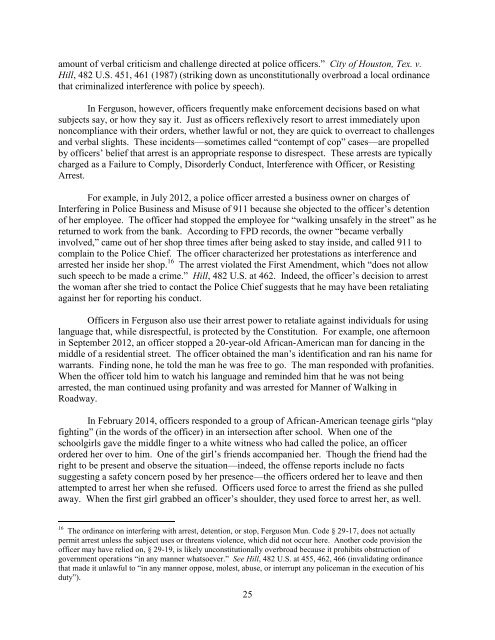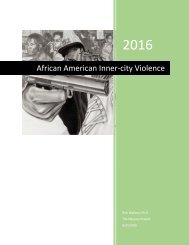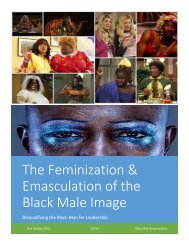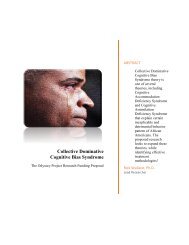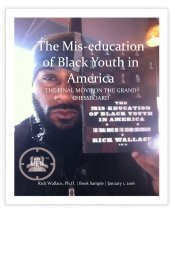U.S. Justice Department Report on the Ferguson Police Department
Ferguson’s law enforcement practices are shaped by the City’s focus on revenue rather than by public safety needs. This emphasis on revenue has compromised the institutional character of Ferguson’s police department, contributing to a pattern of unconstitutional policing, and has also shaped its municipal court, leading to procedures that raise due process concerns and inflict unnecessary harm on members of the Ferguson community.
Ferguson’s law enforcement practices are shaped by the City’s focus on revenue rather than by public safety needs. This emphasis on revenue has compromised the institutional character of Ferguson’s police department, contributing to a pattern of unconstitutional policing, and has also shaped its municipal court, leading to procedures that raise due process concerns and inflict unnecessary harm on members of the Ferguson community.
You also want an ePaper? Increase the reach of your titles
YUMPU automatically turns print PDFs into web optimized ePapers that Google loves.
amount of verbal criticism and challenge directed at police officers.” City of Houst<strong>on</strong>, Tex. v.<br />
Hill, 482 U.S. 451, 461 (1987) (striking down as unc<strong>on</strong>stituti<strong>on</strong>ally overbroad a local ordinance<br />
that criminalized interference with police by speech).<br />
In Fergus<strong>on</strong>, however, officers frequently make enforcement decisi<strong>on</strong>s based <strong>on</strong> what<br />
subjects say, or how <strong>the</strong>y say it. Just as officers reflexively resort to arrest immediately up<strong>on</strong><br />
n<strong>on</strong>compliance with <strong>the</strong>ir orders, whe<strong>the</strong>r lawful or not, <strong>the</strong>y are quick to overreact to challenges<br />
and verbal slights. These incidents—sometimes called “c<strong>on</strong>tempt of cop” cases—are propelled<br />
by officers’ belief that arrest is an appropriate resp<strong>on</strong>se to disrespect. These arrests are typically<br />
charged as a Failure to Comply, Disorderly C<strong>on</strong>duct, Interference with Officer, or Resisting<br />
Arrest.<br />
For example, in July 2012, a police officer arrested a business owner <strong>on</strong> charges of<br />
Interfering in <strong>Police</strong> Business and Misuse of 911 because she objected to <strong>the</strong> officer’s detenti<strong>on</strong><br />
of her employee. The officer had stopped <strong>the</strong> employee for “walking unsafely in <strong>the</strong> street” as he<br />
returned to work from <strong>the</strong> bank. According to FPD records, <strong>the</strong> owner “became verbally<br />
involved,” came out of her shop three times after being asked to stay inside, and called 911 to<br />
complain to <strong>the</strong> <strong>Police</strong> Chief. The officer characterized her protestati<strong>on</strong>s as interference and<br />
arrested her inside her shop. 16 The arrest violated <strong>the</strong> First Amendment, which “does not allow<br />
such speech to be made a crime.” Hill, 482 U.S. at 462. Indeed, <strong>the</strong> officer’s decisi<strong>on</strong> to arrest<br />
<strong>the</strong> woman after she tried to c<strong>on</strong>tact <strong>the</strong> <strong>Police</strong> Chief suggests that he may have been retaliating<br />
against her for reporting his c<strong>on</strong>duct.<br />
Officers in Fergus<strong>on</strong> also use <strong>the</strong>ir arrest power to retaliate against individuals for using<br />
language that, while disrespectful, is protected by <strong>the</strong> C<strong>on</strong>stituti<strong>on</strong>. For example, <strong>on</strong>e afterno<strong>on</strong><br />
in September 2012, an officer stopped a 20-year-old African-American man for dancing in <strong>the</strong><br />
middle of a residential street. The officer obtained <strong>the</strong> man’s identificati<strong>on</strong> and ran his name for<br />
warrants. Finding n<strong>on</strong>e, he told <strong>the</strong> man he was free to go. The man resp<strong>on</strong>ded with profanities.<br />
When <strong>the</strong> officer told him to watch his language and reminded him that he was not being<br />
arrested, <strong>the</strong> man c<strong>on</strong>tinued using profanity and was arrested for Manner of Walking in<br />
Roadway.<br />
In February 2014, officers resp<strong>on</strong>ded to a group of African-American teenage girls “play<br />
fighting” (in <strong>the</strong> words of <strong>the</strong> officer) in an intersecti<strong>on</strong> after school. When <strong>on</strong>e of <strong>the</strong><br />
schoolgirls gave <strong>the</strong> middle finger to a white witness who had called <strong>the</strong> police, an officer<br />
ordered her over to him. One of <strong>the</strong> girl’s friends accompanied her. Though <strong>the</strong> friend had <strong>the</strong><br />
right to be present and observe <strong>the</strong> situati<strong>on</strong>—indeed, <strong>the</strong> offense reports include no facts<br />
suggesting a safety c<strong>on</strong>cern posed by her presence—<strong>the</strong> officers ordered her to leave and <strong>the</strong>n<br />
attempted to arrest her when she refused. Officers used force to arrest <strong>the</strong> friend as she pulled<br />
away. When <strong>the</strong> first girl grabbed an officer’s shoulder, <strong>the</strong>y used force to arrest her, as well.<br />
16 The ordinance <strong>on</strong> interfering with arrest, detenti<strong>on</strong>, or stop, Fergus<strong>on</strong> Mun. Code § 29-17, does not actually<br />
permit arrest unless <strong>the</strong> subject uses or threatens violence, which did not occur here. Ano<strong>the</strong>r code provisi<strong>on</strong> <strong>the</strong><br />
officer may have relied <strong>on</strong>, § 29-19, is likely unc<strong>on</strong>stituti<strong>on</strong>ally overbroad because it prohibits obstructi<strong>on</strong> of<br />
government operati<strong>on</strong>s “in any manner whatsoever.” See Hill, 482 U.S. at 455, 462, 466 (invalidating ordinance<br />
that made it unlawful to “in any manner oppose, molest, abuse, or interrupt any policeman in <strong>the</strong> executi<strong>on</strong> of his<br />
duty”).<br />
25


